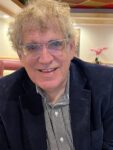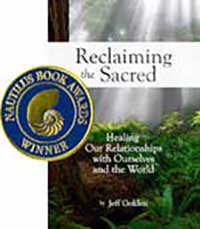Reclaiming the Sacred: Healing Our Relationships with Ourselves and the World by Jeff Golden; Self-Published (c) 2022; ISBN: B0BKQX7M27
By Rabbi Michael Leo Samuel

 CHULA VISTA, California — Delving into Jeff Golden’s Reclaiming the Sacred brought to mind a profound thought often expressed by Erich Fromm: “It is not the man who has much who is much, it is the person who is much, who has much.” This sentiment resonates deeply with the themes in Golden’s work.
CHULA VISTA, California — Delving into Jeff Golden’s Reclaiming the Sacred brought to mind a profound thought often expressed by Erich Fromm: “It is not the man who has much who is much, it is the person who is much, who has much.” This sentiment resonates deeply with the themes in Golden’s work.
Fromm, a distinguished psychoanalyst and philosopher, advocated for the intrinsic value of personal development and self-actualization over material wealth. His perspective, critiquing consumer culture, aligns with Golden’s exploration of how true worth and significance are rooted in our character and inner qualities rather than in our possessions. This idea underscores the importance of nurturing our inner selves to attain genuine fulfillment and richness in life.
In the world of self-help and spiritual enlightenment literature, Reclaiming the Sacred by Jeff Golden stands out as a beacon of depth and practical wisdom. Unlike many titles in this genre that offer nebulous advice and lack substance, Golden’s work delves deeply into the complexities of our relationship with materialism and wealth, and how these relate to broader issues of scarcity, love, and happiness.
In a world increasingly driven by material success and financial achievement, Golden’s book is highly relevant. He addresses a fundamental conflict many face today – the pursuit of wealth and material possessions, and the quest for genuine happiness and fulfillment.
By examining how materialism and the pursuit of wealth can lead to a sense of scarcity, Golden highlights the psychological and emotional effects of living in a consumer-driven culture. This understanding is crucial for individuals seeking a more balanced and contented life.
One of the things I enjoyed about the book was the citations from famous thinkers such as the medieval Muslim poet Rumi and quotes from Thich Nhat Hanh about a world that mindlessly pursues a life philosophy of consumerism that can prove dangerous for our survival as a species. Golden warns, “But this is not who we are. It is not who we have been for nearly all of human history, and it is not who we need to be” (p. 164).
I agree.
He then provides some breathing exercises to remind us why the breath of life is something miraculous.
Golden’s work encourages readers to reassess their values and life goals. By understanding the limited capacity of material wealth to bring long-term happiness, individuals can start to prioritize aspects of life that foster true contentment, such as relationships, community, and personal growth.
There is lots of perennial wisdom in this book.
The book’s focus on love as an antidote to scarcity touches on broader societal issues. It suggests that cultivating a culture of compassion, altruism, and community can counteract the negative aspects of materialism, leading to healthier and more harmonious societies.
Most importantly, in my opinion, Golden’s exploration of these themes provides a foundation for sustainable happiness that isn’t reliant on external factors like wealth or possessions. This approach aligns with many psychological and philosophical perspectives that emphasize internal sources of happiness and well-being.
Golden makes us think and encourages us to start questioning the role of wealth and materialism in our lives, He also indirectly critiques current economic systems and consumer culture, encouraging readers to consider alternative ways of organizing society and measuring success.
In short, Golden’s approach is refreshingly grounded. He doesn’t merely criticize societal ills like the pursuit of excessive wealth; instead, he constructs well-thought-out arguments about their dangers and implications. This progression leads the reader through a series of interconnected concepts, culminating in a discussion of how love can serve as an antidote to the sense of scarcity that plagues much of modern society. Despite our material abundance, we find ourselves spiritually impoverished and isolated. We try to fill the emptiness of our souls with materialistic things that cannot sate the human soul.
The book’s strength lies in its combination of poetic moments and solid policy arguments, reflecting Golden’s diverse background as a professor and nonprofit director. These elements are woven together to form a narrative that is both magical and logical, showcasing Golden’s range as a writer. His varied experiences lend credibility and depth to his insights, making the book not just another spiritual guide, but a substantial piece of literature that offers real, implementable solutions.
Reclaiming the Sacred is a valuable resource for anyone looking to understand the deeper aspects of human happiness and societal well-being. It’s a guide that offers more than just transient solutions, aiming to initiate a fundamental shift in values and perspectives. His book can offer readers a positive perspective that can change lives –if the reader takes to heart the soulful messages that it contains.
I have found that Reclaiming the Sacred is a well-researched, engaging, and insightful read. It challenges readers to reconsider their values and priorities, offering a path towards a more humane and fulfilling life. It’s a book that speaks to the heart and mind, providing a unique blend of scholarly insight and compassionate guidance for navigating the complexities of modern life.
Reclaiming the Sacred is well annotated, but in the future, the author may want to add an index for his readers. Being able to peruse such an index would greatly enable the reader to mine valuable information about any given topic.
*
Rabbi Michael Leo Samuel is spiritual leader of Temple Beth Shalom in Chula Vista. He may be contacted via michael.samuel@sdjewishw0rld.com